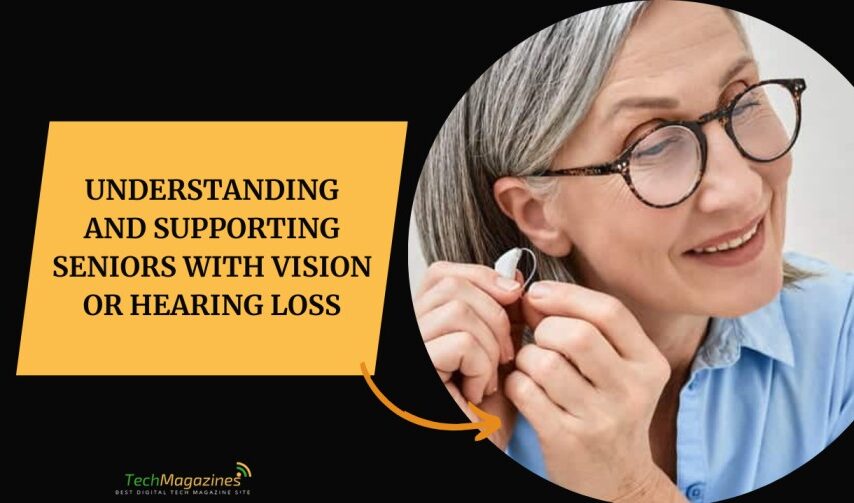As people age, changes in vision and hearing are common. These changes can make daily activities more challenging and impact a senior’s ability to communicate, engage with others, and maintain independence. However, with the right support and strategies, seniors with vision or hearing loss can continue to live fulfilling lives.
Understanding these challenges and learning how to provide practical and emotional support can make a big difference in the quality of life for older adults. This article explores the causes of vision and hearing loss in seniors, how it affects daily life, and ways to help seniors adapt to these changes.
Common Causes of Vision and Hearing Loss in Seniors
Vision Loss
Aging can lead to various eye conditions that impact sight. Some of the most common include:
- Cataracts – A clouding of the eye’s lens that causes blurry vision. Cataracts can often be treated with surgery.
- Glaucoma – Increased pressure in the eye that can damage the optic nerve, leading to vision loss if untreated.
- Macular Degeneration – A condition that affects the central part of vision, making it hard to read or recognize faces.
- Diabetic Retinopathy – Damage to the blood vessels in the eye due to diabetes, which can cause blindness if not managed.
Hearing Loss
Hearing loss in seniors is also common and can result from:
- Presbycusis – Age-related hearing loss that affects high-frequency sounds and makes it difficult to understand speech.
- Noise-Induced Hearing Loss – Long-term exposure to loud noises over a lifetime can damage hearing.
- Ear Infections or Blockages – Wax buildup or infections can cause temporary or permanent hearing issues.
- Medical Conditions – Diabetes, high blood pressure, and certain medications can contribute to hearing loss.
How Vision and Hearing Loss Impact Daily Life
Vision and hearing impairments can significantly impact a senior’s independence, safety, and emotional well-being.
- Communication Challenges – Hearing loss can make it difficult to follow conversations, leading to frustration and isolation.
- Difficulty with Daily Tasks – Poor vision can make activities like reading, cooking, and navigating the home more challenging.
- Increased Fall Risk – Limited vision and balance issues related to hearing loss increase the likelihood of falls.
- Social Isolation – Seniors who struggle to see or hear may withdraw from social activities, leading to loneliness and depression.
Caregivers, family members, and home care providers can play a key role in helping seniors adapt to these changes.
Ways to Support Seniors with Vision or Hearing Loss
1. Improve Communication
- Speak clearly and at a moderate pace, especially for those with hearing loss.
- Face the senior while talking so they can read lips or see facial expressions.
- Reduce background noise, such as the TV or radio, during conversations.
- Use written notes or text-based communication when necessary.
2. Modify the Home for Safety and Accessibility
- Ensure good lighting throughout the home to help those with vision impairments.
- Remove clutter and tripping hazards to prevent falls.
- Use contrasting colors on furniture and walls to make objects easier to see.
- Install grab bars in bathrooms and handrails on stairs for extra support.
3. Utilize Assistive Technology
There are many devices available to help seniors with vision or hearing difficulties:
- For Vision Loss:
- Magnifiers and large-print books
- Talking clocks and watches
- Screen readers and voice-controlled devices
- For Hearing Loss:
- Hearing aids or cochlear implants
- Captioned telephones and TV services
- Personal amplifiers to enhance sound
4. Encourage Social Engagement
Staying connected with family and friends is essential for emotional well-being. To help seniors with sensory impairments stay engaged:
- Arrange small, quiet gatherings where they can comfortably communicate.
- Encourage participation in senior centers or clubs that offer inclusive activities.
- Support hobbies that fit their abilities, such as listening to audiobooks or enjoying tactile arts like knitting.
5. Seek Professional Support
If a senior’s vision or hearing loss is affecting their daily life, it’s important to seek medical help. Regular check-ups with eye doctors and audiologists can lead to early detection and better management of these conditions.
For additional support at home, professional caregivers can provide assistance with daily tasks, ensure safety, and offer companionship. Organizations like Senior Helpers offer personalized home care services designed to help seniors maintain independence and quality of life, even as they face sensory challenges.
The Emotional Impact of Vision and Hearing Loss
Losing the ability to see or hear clearly can be frustrating and overwhelming for seniors. They may feel embarrassed, anxious, or even depressed due to their limitations. Here are some ways to offer emotional support:
- Be Patient and Understanding – Acknowledge their frustrations and offer reassurance.
- Encourage Open Conversations – Allow them to express their feelings and fears about their condition.
- Provide Positive Reinforcement – Celebrate small successes, such as using new assistive devices or adapting to changes.
- Include Them in Decisions – Let them have a say in choosing assistive devices or making modifications to their home.
Maintaining a positive and supportive environment can make a significant difference in their emotional well-being.
Conclusion
Vision and hearing loss are common in seniors, but with the right support, they can continue to lead independent and fulfilling lives. By making communication easier, improving home safety, using assistive technology, and providing emotional encouragement, caregivers and family members can help seniors navigate these challenges successfully.
For those who need additional help, home care services like Senior Helpers provide specialized assistance tailored to seniors with vision or hearing impairments. With the right approach, seniors can stay engaged, safe, and happy, even as their needs change.








